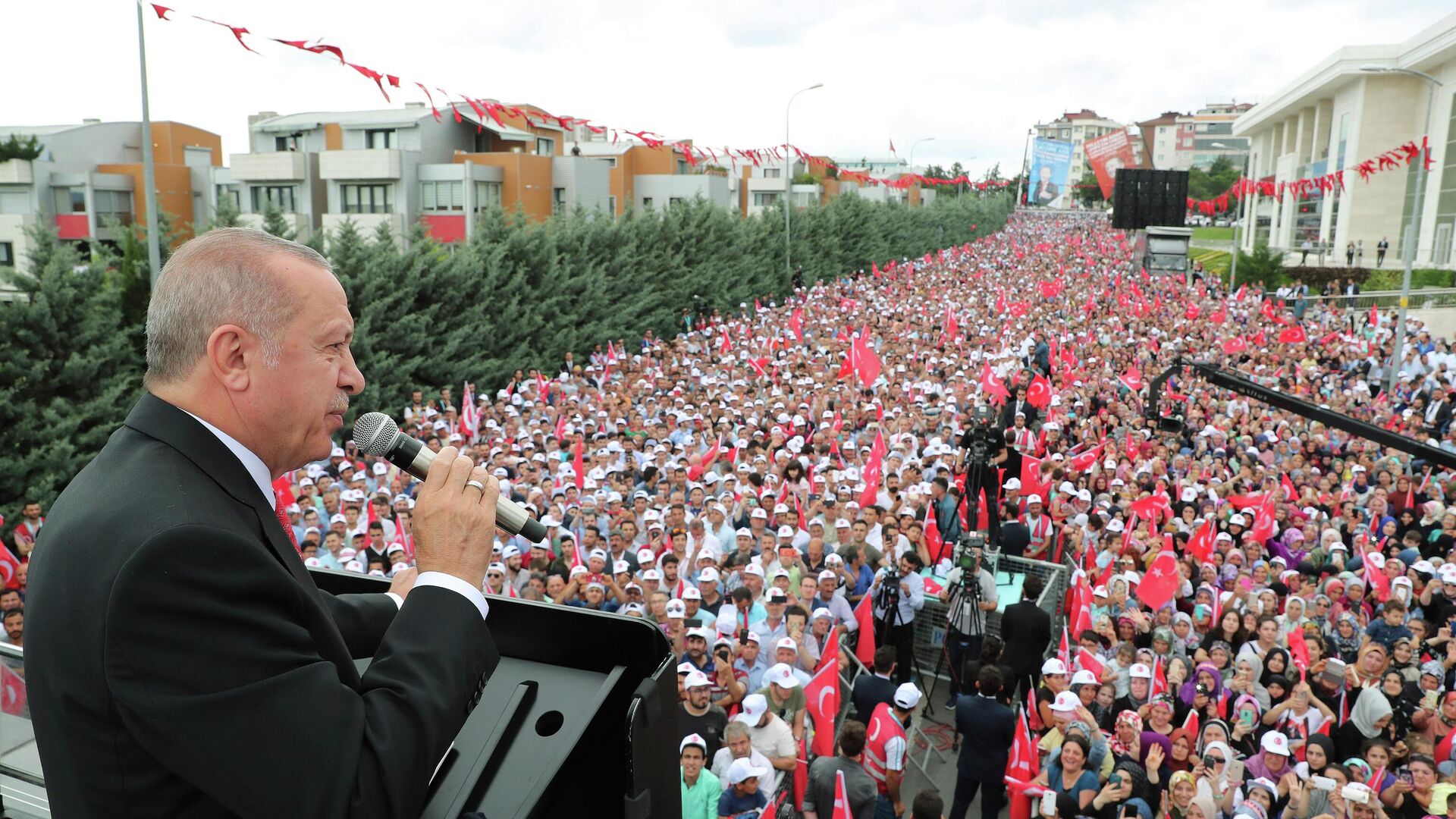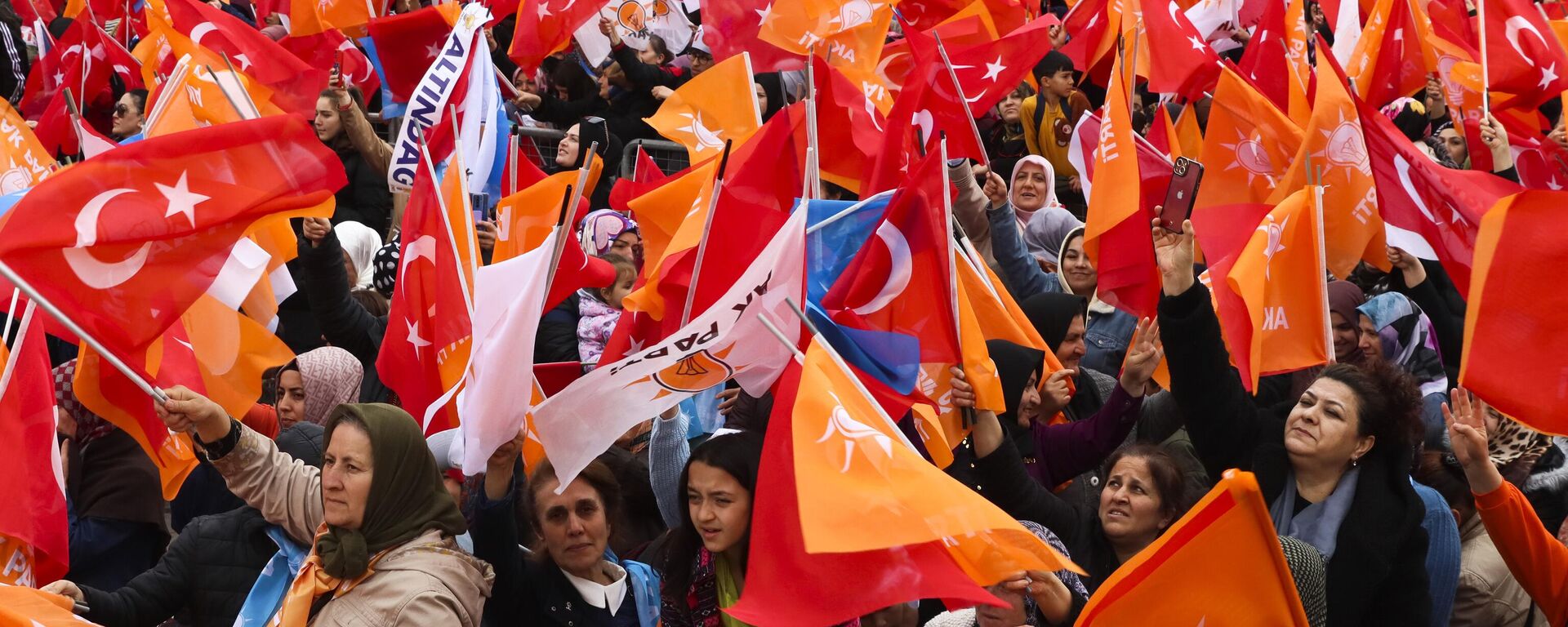https://sputnikglobe.com/20230516/turkiye-election-shattered-the-illusion-that-erdogan-was-untouchable-1110392035.html
Turkiye Election Outcomes Are Unevident
Turkiye Election Outcomes Are Unevident
Sputnik International
After a tight election that has necessitated a runoff, Turkish President Erdogan is no longer untouchable in Turkish politics, an expert tells Sputnik
2023-05-16T03:24+0000
2023-05-16T03:24+0000
2024-03-11T10:58+0000
recep tayyip erdogan
kemal kilicdaroglu
turkiye
2023 turkish presidential election
analysis
election
https://cdn1.img.sputnikglobe.com/img/07e6/04/11/1094825649_0:160:3073:1888_1920x0_80_0_0_9b77ed943b229cfa7993eb5eef16bc91.jpg
The outcome of the May 14 Turkish general election has shown that there is still no obvious winner. That's essentially "broken the belief that Turkish President Recep Tayyip Erdogan is untouchable", independent investigative journalist Christopher Helali told Sputnik.While Erdogan received more votes than many observers expected, he failed to receive 50% of the vote, forcing a runoff election with opposition leader Kemal Kilicdaroglu in two weeks.While much of Western media has focused on what the election could mean for geopolitics, Helali said the biggest issues for the Turkish people were economic ones.According to Helali, Erdogan had “multiple instances where he could have done different policies that might have affected some significant change economically, but they weren’t done.”Helali further suggested that strained Turkish relations with regional governments may soon ease. "I think in particular Greece, Armenia, maybe some changes in regards to Syria,” he said.
https://sputnikglobe.com/20230515/turkiye-wont-turn-its-back-on-russia-whoever-wins-presidential-runoff-1110386303.html
turkiye
Sputnik International
feedback@sputniknews.com
+74956456601
MIA „Rossiya Segodnya“
2023
Sputnik International
feedback@sputniknews.com
+74956456601
MIA „Rossiya Segodnya“
News
en_EN
Sputnik International
feedback@sputniknews.com
+74956456601
MIA „Rossiya Segodnya“
Sputnik International
feedback@sputniknews.com
+74956456601
MIA „Rossiya Segodnya“
turkiye election, turkey election, erdogan, kilicdaroglu, john kiriakou, michelle witte
turkiye election, turkey election, erdogan, kilicdaroglu, john kiriakou, michelle witte
Turkiye Election Outcomes Are Unevident
03:24 GMT 16.05.2023 (Updated: 10:58 GMT 11.03.2024) A runoff Turkish election is scheduled to take place May 28 after no contender managed to gain 50% of the vote over the weekend.
The outcome of the May 14 Turkish general election has shown that there is still no obvious winner. That's essentially "broken the belief that Turkish President Recep Tayyip Erdogan is untouchable", independent investigative journalist Christopher Helali told Sputnik.
While Erdogan received more votes than many observers expected, he failed to receive 50% of the vote, forcing a runoff election with opposition leader Kemal Kilicdaroglu in two weeks.
Erdogan is expected to win the runoff election because the third candidate in the race, Sinan Ogan and his voters are more likely to support Erdogan than Kilicdaroglu in the runoff, Helali told Radio Sputnik's Political Misfits on Monday.
While much of Western media has focused on what the election could mean for geopolitics, Helali said the biggest issues for the Turkish people were economic ones.
“Economic issues for Turkish people have been at the forefront over the past few years. And we’ve seen some unconventional economic practices by the government to try to rein in inflation. Things that many were quite surprised about in terms of economic policy, that have failed to materialize any real benefits for the Turkish people,” Helali explained.
According to Helali, Erdogan had “multiple instances where he could have done different policies that might have affected some significant change economically, but they weren’t done.”
Helali further suggested that strained Turkish relations with regional governments may soon ease. "I think in particular Greece, Armenia, maybe some changes in regards to Syria,” he said.



